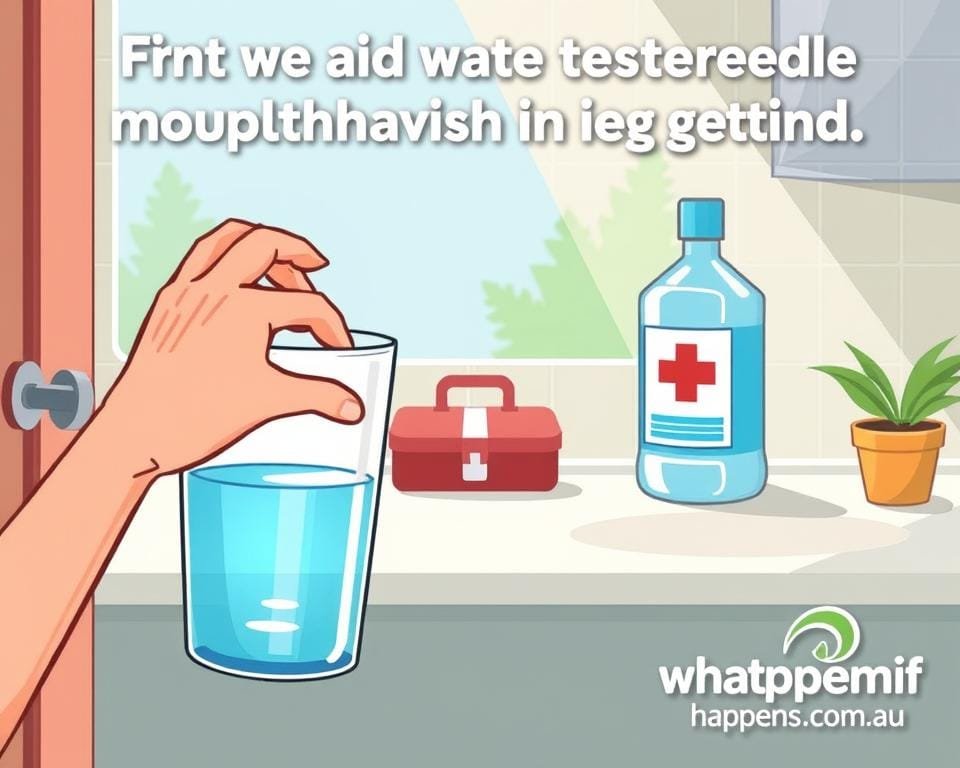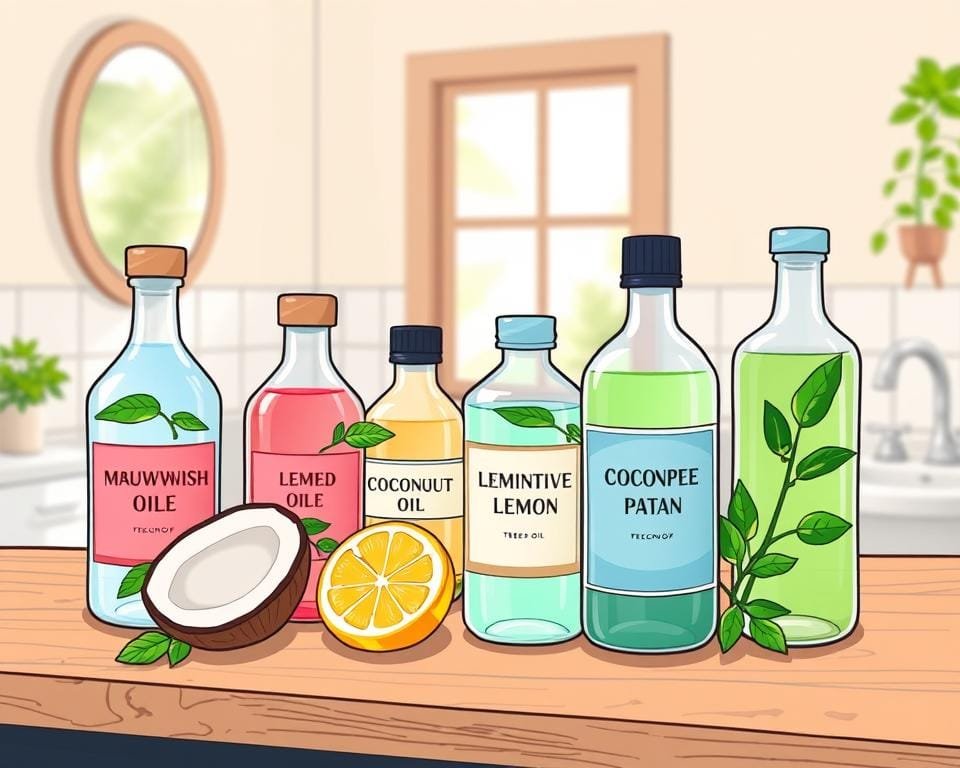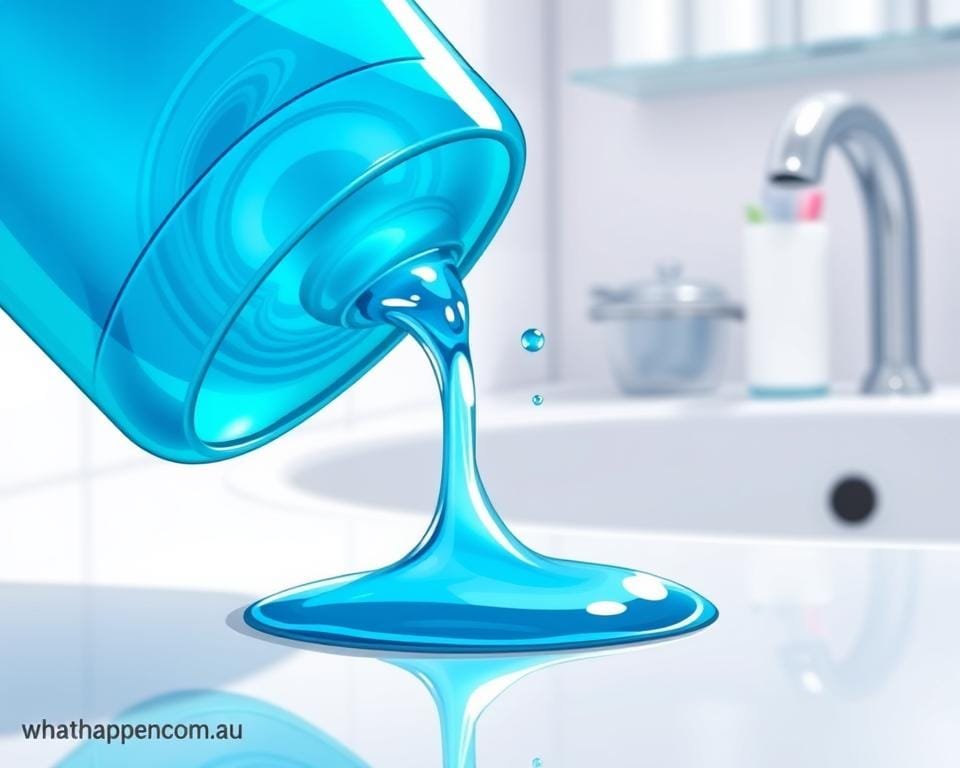Mouthwash is used to freshen breath and keep teeth clean. But, it’s not meant to be swallowed. Swallowing mouthwash can cause serious problems, especially if you drink a lot of it. Most people swallow a little mouthwash when they rinse their mouth after brushing1.
Small amounts of mouthwash are usually okay. But, drinking a lot of it, especially by kids, can be dangerous1.
The FDA watches over mouthwash because it’s like a medicine1. Mouthwash can have things like alcohol, chlorine, and essential oils in it2. These can be harmful if swallowed, especially for babies and young kids2.
Drinking too much mouthwash is called a mouthwash overdose1. Signs of this include slurred speech, fast heart rate, and trouble breathing1. Drinking too much mouthwash can make you very sick or even kill you2.
Adults can handle more mouthwash than kids1. Kids are more likely to get sick from mouthwash because they can’t handle alcohol well2. If you swallow a lot of mouthwash, don’t try to throw it up1. Call Poison Control and get help right away2.
Key Takeaways
- Mouthwash is not intended to be swallowed and can be toxic in large quantities.
- Small amounts of swallowed mouthwash are unlikely to have adverse effects.
- A mouthwash overdose occurs when a person ingests a quantity beyond standard usage limits.
- Symptoms of a mouthwash overdose can include slurred speech, nausea, vomiting, and difficulty breathing.
- Children are more susceptible to mouthwash ingredients and have a lower threshold for alcohol intoxication.
- Contact Poison Control and seek emergency medical services for questions about mouthwash ingestion.
Understanding Mouthwash Ingredients
Mouthwash is a common product for oral hygiene. It helps freshen breath and keep teeth and gums healthy. Knowing the mouthwash ingredients is key to safe and effective use.
Common Active Ingredients in Mouthwash
The main active ingredients in mouthwash are:
- Cetylpyridinium chloride
- Chlorhexidine
- Essential oils (eucalyptol, menthol, methyl salicylate, thymol)
- Fluoride
- Peroxide
These ingredients kill bacteria, reduce plaque, and prevent tooth decay. But, too much can be toxic. Symptoms include abdominal pain, eye burns, coma, dizziness, headache, and skin issues3.
FDA Regulations on Mouthwash
The FDA regulates mouthwash as an over-the-counter drug. Manufacturers must follow strict guidelines. The FDA requires labels to include:
- Active ingredients and their concentrations
- Warnings about potential side effects
- Directions for proper use
It’s important to follow the label’s instructions to avoid problems. Kids aged 6 to 12 should be watched when using mouthwash to prevent overdose4.
“Mouthwash is a valuable tool for maintaining oral health, but it’s important to use it responsibly and be aware of the potential risks associated with its ingredients.” – Dr. Sarah Thompson, DDS
| Ingredient | Function | Safe Concentration |
|---|---|---|
| Cetylpyridinium chloride | Antiseptic | 0.045-0.1% |
| Chlorhexidine | Antibacterial | 0.12-0.2% |
| Essential oils | Freshens breath | Varies by oil |
| Fluoride | Prevents tooth decay | 0.02-0.05% |
| Peroxide | Whitens teeth | 1.5-3% |
By knowing the ingredients in mouthwash and following FDA rules, you can safely use it. This helps keep your smile healthy.
Is Swallowing a Small Amount of Mouthwash Harmful?
Swallowing a little mouthwash by accident is usually okay. It happens when you rinse your mouth too hard. The leftover mouthwash in your mouth is unlikely to hurt you5.
But, mouthwash is not meant to be swallowed. It has ingredients that can be dangerous if you drink too much5. These ingredients include:
- Ethyl alcohol (ethanol)
- Chlorhexidine gluconate
- Hydrogen peroxide
- Methyl salicylate
- Fluoride5
These parts help fight plaque, gingivitis, and bad breath. But, too much can cause problems5. For example, too much fluoride can make you feel sick5.
Children are more at risk from swallowing mouthwash. The American Dental Association says kids under 6 shouldn’t use mouthwash65. Even a little bit of alcohol can harm kids and make them feel drunk5.
“Mouthwashes and mouth rinses are designed to be spit out and not swallowed due to potentially poisonous ingredients.”6
To avoid swallowing mouthwash, take these steps:
- Keep mouthwash away from kids5
- Watch kids aged 6 to 12 when they use mouthwash65
- Teach kids to spit it out5
- Use mouthwash without alcohol5
| Age Group | Mouthwash Recommendations |
|---|---|
| Under 6 years | Not recommended due to swallowing reflex issues65 |
| 6-12 years | Supervision required during use65 |
| Over 12 years | Follow proper usage instructions and avoid swallowing |
In summary, swallowing a little mouthwash is usually safe. But, drinking too much can be harmful. By following the right steps and being careful, you can use mouthwash safely and avoid risks.
Potential Side Effects of Ingesting Mouthwash
Mouthwash is meant to freshen breath and kill bacteria. But swallowing it can cause side effects. These effects are usually mild if only a small amount is swallowed, as the body can get rid of it easily7. Still, it’s important to know the risks of swallowing mouthwash.
Nausea and Stomach Upset
Swallowing mouthwash often leads to nausea and stomach upset. The alcohol and essential oils in mouthwash can upset the stomach. This can cause queasiness, pain, or vomiting7.
Drinking water or milk can help make the chemicals less strong. This can make you feel better.
Throat Irritation
Swallowing mouthwash can also irritate the throat. The strong ingredients can make the throat burn or feel sore. This usually goes away quickly.
Gargling with warm salt water can help soothe the throat. It can make you feel better faster.
Diarrhea
Swallowing mouthwash can also cause diarrhea. This is especially true if the mouthwash has ingredients like sorbitol or xylitol. These can make you have loose stools.
Diarrhea from mouthwash usually doesn’t last long. But, it’s important to drink lots of fluids. This helps replace lost salts and keeps you hydrated8.
While these side effects are usually mild, swallowing alcohol-based mouthwash can be harmful. It can damage internal organs and lead to alcohol addiction7. If you have severe symptoms like trouble breathing or dizziness, call the National Poison Control Center at 1-800-222-1222789.
Risks of Swallowing Large Quantities of Mouthwash
Mouthwash is great for keeping your mouth clean, but swallowing too much can be dangerous. The main dangers include alcohol poisoning, fluoride poisoning, and harm from other ingredients.
Alcohol Intoxication
Many mouthwashes have a lot of alcohol, up to 26.9% in some brands. This is more than beer and almost as much as wine10. Drinking just 2 to 4.5 ounces can be like having one drink10. This can lead to alcohol poisoning, especially if you drink too much in a short time10.
Fluoride Toxicity
Fluoride in mouthwash helps prevent cavities. But too much can be toxic. It can cause nausea, vomiting, and stomach pain. In serious cases, it might even cause seizures or heart problems.
Other Harmful Ingredients
Mouthwashes also have other ingredients that can be harmful. These include:
- Chlorhexidine gluconate
- Hydrogen peroxide
- Methyl salicylate
Drinking a lot of these can cause stomach pain, diarrhea, and nausea. It can also make you dizzy, lower your body temperature, and affect your heart rate10. Severe cases might include dizziness, drowsiness, trouble breathing, convulsions, or even coma11.
| Ingredient | Potential Risks |
|---|---|
| Alcohol | Intoxication, impaired coordination, changes in heart rate |
| Fluoride | Nausea, vomiting, abdominal pain, seizures, cardiac arrhythmias |
| Chlorhexidine gluconate | Irritation, allergic reactions |
| Hydrogen peroxide | Gastrointestinal irritation, vomiting |
| Methyl salicylate | Nausea, vomiting, tinnitus, convulsions |
If you think you’ve swallowed too much mouthwash, call 911 or the Poison Help hotline (1-800-222-1222) right away10. The National Poison Control Center is also available at 1-800-222-1222 for help with mouthwash poisoning11.
Mouthwash Overdose Symptoms
Mouthwash overdose happens when someone uses too much mouthwash. Kids aged 6 to 12 should be watched when using mouthwash. Kids under 6 might swallow it by mistake, so it’s not safe for them12. Ingredients like chlorhexidine gluconate, ethanol, hydrogen peroxide, and methyl salicylate can be harmful in large amounts13.
Signs of mouthwash overdose can vary. They can be mild or serious, depending on how much was used and the person’s health. Common signs include:
- Nausea and vomiting (sometimes with blood)
- Abdominal pain and diarrhea
- Dizziness, drowsiness, and headache
- Slurred speech and impaired coordination
- Rapid heart rate and changes in heartbeat
- Low blood pressure, blood sugar, and body temperature
- Difficulty breathing and shallow, fast breathing
- Burns to the eye and sore throat
- Unconsciousness and coma in severe cases
Studies show 10-15% of alcoholics in detox use non-beverage alcohol like mouthwash. Half of these are regular users14. Listerine has about 24-27% alcohol, much more than beer, wine, or other liquors14.
Severe cases of mouthwash overdose, especially with fluoride or ethanol, can lead to convulsions or coma. If this happens, go to the emergency room right away12. Treatment may include watching vital signs, doing tests, and giving medicine13.
If you think someone has overdosed on mouthwash, call for help right away. Don’t make them vomit unless a doctor or poison control tells you to13. The Poison Help hotline (1-800-222-1222) is available 24/7 for advice on poisoning1213.
What to Do If You Accidentally Swallow Mouthwash
Swallowing a small amount of mouthwash is usually not a big deal. But, it’s good to know the risks and what to do if it happens. Mouthwashes have ingredients like fluoride that can upset your stomach if swallowed5. They also have alcohol, menthol, and other chemicals that can be harmful in large amounts5.

Rinsing Your Mouth with Water
If you swallow mouthwash by accident, start by rinsing your mouth with water. This helps to dilute the chemicals and reduces the risk of more harm. Keep rinsing and spitting out the water until your mouth is clean.
Drinking Milk to Dilute Chemicals
After rinsing, drinking a glass of milk is a good next step. Milk can neutralize and dilute mouthwash chemicals, which may help avoid stomach upset. The fat in milk can also protect your digestive tract from irritation.
Monitoring for Adverse Reactions
Even though swallowing a little mouthwash is usually okay, watch for any bad reactions5. Signs of too much mouthwash include slurred speech, fast heart rate, and trouble breathing1. If you swallow a lot, you might feel dizzy, have trouble breathing, or even have seizures5.
If you see any bad symptoms or swallow a lot of mouthwash, call the Poison Control Center1. They can help based on what you swallowed. They might suggest IV fluids, medicines, or even dialysis5.
Preventing mouthwash accidents is the best way to stay safe. Always use mouthwash as directed and don’t take too much. Keep it away from kids to avoid accidents.
When to Seek Medical Attention
Mouthwash is usually safe when used right. But, swallowing it by accident can be serious, especially for kids. The American Dental Association says kids under 6 should not use mouthwash to avoid swallowing it5. Young kids might have trouble stopping themselves from swallowing15.
If a kid swallows mouthwash, find out how much and call the Poison Control Center at 800-222-12225. Even a little alcohol from mouthwash can harm kids5.
Contacting Poison Control Center
Call the National Poison Control Center at 1-800-222-1222 for emergencies15. Be ready to share:
- Type of mouthwash ingested
- Amount of mouthwash swallowed
- Age and weight of the person who ingested the mouthwash
- Any symptoms experienced
The Poison Control Center will tell you what to do next. This might mean watching for bad reactions or going to the hospital.
Visiting the Emergency Room
If a kid swallows a lot of mouthwash, go to the emergency room1. Signs of mouthwash overdose include:
| Symptom | Description |
|---|---|
| Dizziness | Feeling lightheaded or unsteady |
| Drowsiness | Feeling very sleepy or tired |
| Trouble breathing | Having trouble breathing or feeling short of breath |
| Convulsions | Having uncontrollable shaking or seizures |
| Coma | Being completely unconscious and unresponsive |
Treatments for mouthwash overdose might include IV fluids, medicines, and activated charcoal5. In very bad cases, they might need to use kidney dialysis5.
When it comes to mouthwash, it’s always safer to get help if you think a lot was swallowed.
Preventing Accidental Mouthwash Ingestion
Mouthwash is a common product for oral hygiene but can be dangerous if swallowed, especially by kids. To avoid mouthwash accidents, it’s key to store it safely and follow age guidelines.
A recent survey found that 12.5% of poisonings in kids under 6 were from products like mouthwash16. To address this, makers have added child-resistant caps and warning labels16. In 1995, the Consumer Product Safety Commission made a rule for mouthwashes with at least 3 grams of ethanol to have child-resistant packaging5.
Proper Mouthwash Usage Techniques
To use mouthwash safely and right, follow these tips:
- Children between 6 and 12 should be watched when using mouthwash17.
- Kids under 6 might have trouble not swallowing mouthwash, so it’s not good for them17. The American Dental Association also says kids under 6 shouldn’t use mouthwash5.
- Mouthwashes are meant to be spit out, not swallowed, because they can be harmful if swallowed a lot17.
- Only use the right amount of mouthwash and rinse for the time suggested before spitting it out.
Storing Mouthwash Safely
Storing mouthwash right is key to stop accidents:
- Keep mouthwash where kids can’t get it, like in a locked cabinet or high shelf.
- Always put the cap back on tightly after use.
- Store mouthwash in its original container with the label on for easy recognition.
- Don’t store mouthwash near other drinks to avoid confusion.
If mouthwash is swallowed by accident, watch for odd signs and call the Poison Control Center’s hotline at 800-222-1222 for help5. Signs of mouthwash overdose, like dizziness or trouble breathing, need quick action17.
| Age Group | Mouthwash Recommendations |
|---|---|
| Under 6 years | Not recommended |
| 6-12 years | Supervised use only |
| Over 12 years | Use as directed |
By using mouthwash correctly and storing it safely, you can avoid accidents and keep your family’s oral hygiene routine safe and effective.
Alternatives to Alcohol-Based Mouthwashes
Most mouthwashes have alcohol18, but there are safer choices for those worried about kids accidentally drinking them. Options like Listerine Smart Rinse Kids, Orajel, ACT, and Crest are alcohol-free and still keep your mouth clean.
You can also make your own mouthwash at home. Use saltwater, baking soda, and coconut oil. Saltwater can help fight bacteria in your mouth19. Baking soda can kill bacteria when used in a 1% solution19.

Coconut oil pulling is another natural method. It involves swishing coconut oil in your mouth for a few minutes. It can help reduce plaque and gum inflammation19. But, studies show it doesn’t kill bacteria in your mouth19.
You can also use hydrogen peroxide, apple cider vinegar, and peppermint oil in homemade mouthwashes. But, hydrogen peroxide can be dangerous if you take too much18. Apple cider vinegar and peppermint oil are safer but can still upset your stomach if you drink too much18.
Propolis, a resin-like material made by bees, has shown to fight bacteria and reduce inflammation. It might be a good alternative to chlorhexidine for oral health.
Even though these alternatives are safer, it’s important to use them correctly and keep them away from kids. Even alcohol-free mouthwashes can have ingredients like fluoride that might upset your stomach if you swallow too much.
Swallow Mouthwash: The Bottom Line
Mouthwashes help keep our mouths healthy with ingredients like fluoride and alcohol5. But, swallowing them can be risky. Even a little can make you feel drunk5. Mouthwashes have alcohol from 5% to 27%, and the higher amounts can make you drunk20.
Swallowing a bit of mouthwash might make you feel sick or dizzy21. But, too much can cause serious problems like trouble breathing or seizures5. It can also harm your kidneys and heart20.
Children are more likely to overdose on mouthwash because they are smaller5. The American Dental Association says kids under 6 shouldn’t use mouthwash520. If a child swallows mouthwash, rinse their mouth with water and call Poison Control for help20.
Always spit out mouthwash and never swallow it. It’s meant to be used in addition to brushing and flossing21. Swish mouthwash in your mouth for 30 seconds, twice a day, to keep your teeth clean21. If you’re worried about alcohol, there are alcohol-free mouthwashes available5.
The key takeaways are to use mouthwash wisely, don’t swallow it, and keep it away from kids. By doing this and taking care of your teeth regularly, you can enjoy mouthwash’s benefits safely.
Conclusion
Mouthwash is key for many in their oral care routine. But, it’s important to use it safely. Swallowing a little mouthwash might make you feel queasy or have diarrhea22. But, too much can cause serious problems like trouble breathing or even organ failure23.
Children aged 6 to 12 need to be watched when using mouthwash. Kids under 6 shouldn’t use it because they might swallow it22.
To avoid swallowing mouthwash by accident, spit it out after rinsing. Also, don’t get distracted while brushing your teeth22. If you swallow a lot of mouthwash, get medical help right away. In serious cases, go to the emergency room and bring the mouthwash bottle22. You can also call the National Poison Control Center at 1-800-222-1222 for help22.
Mouthwash is good for your teeth, but it can be dangerous if swallowed. By following the right use and looking into water flossers23, you can keep your mouth healthy without risks. Stay aware, use mouthwash wisely, and get help if you need it.

